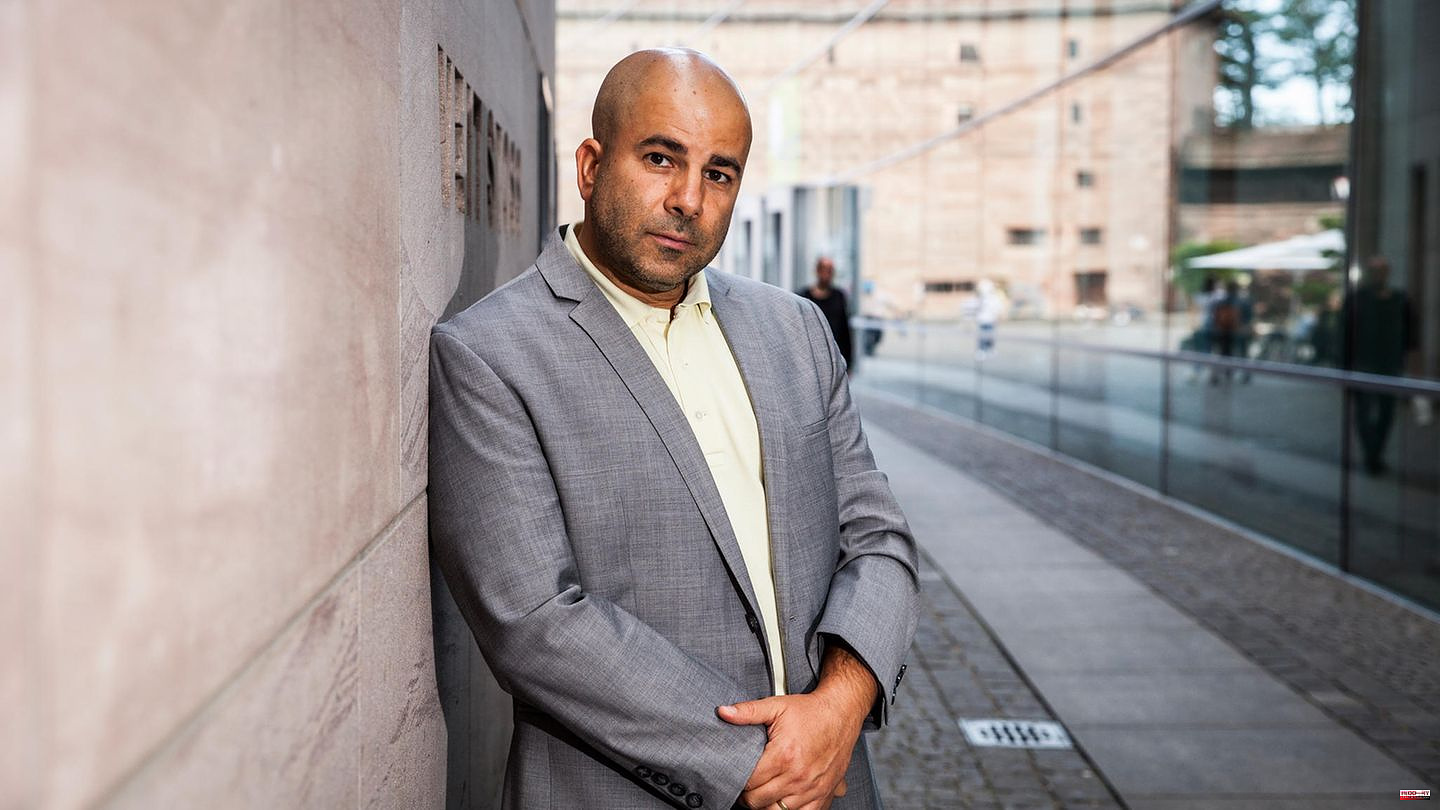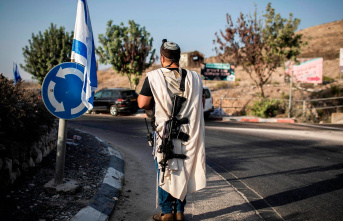Arye Sharuz Shalicar, in your book "Shalom Habibi" you write about your very personal view of the tense relationship between Jews and Arabs - and the possibility of peace and friendship. As an Israeli, how did it come about that you traveled to so many Arab countries? I was an adviser to the former Israeli foreign minister, and in that capacity I got around a lot. Among other things, in those Arab states that now maintain diplomatic relations with Israel. I deliberately wanted to keep my professional role out of the book because I write my books as a private person. And I consider the personal experiences and encounters that I was able to experience in the course of these trips to be more meaningful. As a Jew, I would never have gotten to a country like Oman without my professional activity.
It's no secret that your trips were related to the Abraham Accords, that is, Israel's spectacular peace agreement with the United Arab Emirates and Bahrain, and the normalization of relations with Morocco and Sudan. How was that possible? These relationships weren't new, they didn't come about "out of the blue", but grew over many years. It was a kind of coming out of many Muslim states that have long operated under the rug with Israel. With some this has been going on for 20 years, but not officially.
What role does the influence of Donald Trump's administration play in this process? Much more important than the role of Trump's Middle East team was the threat to Iran as a possible nuclear power. This was increasingly perceived as such by the Emirates and other Gulf States. So one thing led to another. The Americans were only part of the interaction.
The Arab League has just met again for a long time. It is noticeable that the states reconciled with Israel did not send any high-ranking government representatives. Does this league still exist? The Arab League has never found a common voice. It all reminds me of my youth in Berlin Wedding, where I grew up among all sorts of Muslim people. Even then, there was no uniform Arab or Muslim attitude in the schoolyard. The experience in Berlin's multicultural migrant district was formative and not far removed from how the Arab world operates today. They simply don't exist. The linchpin is Iran, which is trying to infiltrate everyone. And thus seen by many as a threatening player. It's not just a security issue. Tourism is strong because it connects and enlightens. There are also questions about energy, medicine, high tech, water management and economic cooperation. Friendships develop and this creates stability.
The outcome of Israel's parliamentary elections has sparked international concern. Itamar Ben-Gvir's far-right party will almost certainly be involved in the next government. What does that mean for the peace that has been reached with Arab states? I am not a right-winger myself, but one has to acknowledge that it was Israel's right-wing parties that – paradoxical as that may sound – were not a hindrance to the peace process, quite the contrary. An example is Menachem Begin, who made peace with Egypt in 1979.
Begin had no coalition with the extreme right. No, but he was prime minister of the Likud, the party of Netanyahu, who is likely to be the next prime minister.
The Israeli historian Tom Segev fears the end of Israel as a rule of law and democracy. Tom Segev is a representative of the left, which has lost badly. Handing out now, one should ask why Israeli voters don't trust them to raise Israeli security awareness. The Labor Party still has four seats and is now weaker than the Arab parties.
How dangerous can an Interior Minister Ben-Gvir be for the coexistence of Arab and Jewish Israelis? It's a phenomenon that we're currently experiencing in many European countries, I'll mention Italy or Sweden here. Of course, there is reason for caution, but it is not an exclusively Israeli problem. The rightward trend around the world has to do with fears that arise from immigration, the fear of the unknown, sometimes rightly so. There are cities in Sweden, such as Malmö, where the police no longer have a hand in some areas, while in Italy it's the mass immigration from Africa. In Israel, it has to do with fear of terror. The Germans quickly forget the attacks that cost lives in Israel. An Israeli who may have lost friends does not do that. It's part of their everyday life. Ben-Gvir takes advantage of this, but I think Netanyahu is smart and experienced enough to handle it.
The situation in the West Bank is escalating. How will the peace process ever proceed? With which peace process? There is no peace process with the Palestinians. That's also my experience with the Arab states I've been to, they're not just disinterested, they're also annoyed. Israel has repeatedly signed peace treaties that the Palestinians have dismissed. Three forces are at work there: Islamic Jihad, i.e. the Palestinian version of ISIS, Hamas, i.e. the Muslim Brotherhood, which countries like Morocco or Egypt perceive as an absolutely dangerous opposition in their own countries, and the third camp is Mahmoud Abbas, who actually only survives because the Israeli army protects him and Hamas keeps him at bay. Completely absurd.
Israel is considered the only liberal democracy in the Middle East, and sees itself as one. Shouldn't it be the primary goal to implement the rule of law for all residents of the West Bank conquered by Israel? I have friends and family who live in this area myself, my little brother and his wife live there. It has nothing to do with the stereotype that is commonly associated with Jewish settlers. These radical settlers that are always talked about are a small minority. Of course you have to take them seriously, but they are not a threat to the rule of law. I see no threat to Israel's democracy. What is clear, however, is that the state must defend itself clearly and unequivocally against Palestinian terror, to which it is exposed at all times.
Your family has Persian roots, you grew up with Muslim-Arab friends in Wedding. Does that make you more empathetic towards the fate of the Arab population? It's come full circle for me, my parents grew up among Muslims in Persia, I am a Jew in Wedding as well. Now I live in Israel with Muslims again. My daughter had an Arab-Muslim kindergarten teacher, I worked with Arab soldiers in the IDF, including Muslims. Of course, my endeavor is biographically determined. As I write in detail in "Shalom Habibi", the peaceful coexistence of Jews and Muslims is my life's work. I really believe in that.
In your book you introduce your colleague Ella Waweya, an Arab-Muslim citizen of Israel who has made a career as an IDF spokeswoman in the army. A combination that is hard to imagine for Western critics of Israel... There are now thousands of Arab citizens, Bedouins, Druze, Christian Arabs, but also Muslims who work in the army and the police and make a career there. This of course contradicts the narrative of so-called Israel critics, that a large part of the Arab population has simply arrived in this state and is making its contribution. Over the past few years, you could clearly see that many of them have risen, like Ella Waweya. She is Muslim, Arab, and she lives openly as a lesbian, which she can only do in Israel. What many people who are calling for a two-state solution in which Jews and Arabs should live separately don't know: most of the 20 percent of Israel's Arab citizens do not want to live in a Palestinian state, but in Israel.
According to a survey by the Palestine Center for Public Opinion, 48 percent of Arabs living in Jerusalem would prefer Israeli citizenship to that of a Palestinian state, although the chances of obtaining it are slim. Why isn't the state opening up? First of all, one has to realize that only Israel is a multicultural state. In a Palestinian state, Jews are not intended and their lives are not secure. The same applies to Syria, Lebanon, Yemen and Iraq. Oddly enough, there is no international boycott movement against them.
That may be the case, but what solution would there be for the people of East Jerusalem or the West Bank? Sometimes the best solution is not to have one, rather than making a seriously wrong decision. Nothing has happened since the mid-nineties, there is a permanent temporary solution. But what would be the solution? The one-state solution would mean that Israel would make all Arabs living there citizens, which would hugely reverse the demographics. The character of the State of Israel, one has to say quite frankly, is Jewish despite all its multicultural character. A two-state solution advocated by many in the West would be a disaster.
Why? One would have to leave the West Bank just as one left Gaza and southern Lebanon, just as one left the Sinai Peninsula. And what always happened there afterwards? Terror. Iran-controlled Hezbollah has established itself in Lebanon, Hamas and Islamic Jihad in Gaza, and the Islamic State in the north-eastern part of Sinai. The "land for peace" concept has always turned out to be bad business for Israel. We gave land, got terror. More missiles are stationed in these areas than in all NATO countries combined – if you exclude the USA. In a few years that would also happen in the West Bank, where these Islamist forces are already raging. Anyone who wants that is to blame for the founding of a new terrorist state.
The BDS boycott movement accuses Israel of operating an apartheid system. Which is absurd, Arabs can hold any office in Israel, and Arab parties were involved in the last governing coalition.
That's true, and yet West Bank Arabs cannot become citizens of Israel, nor citizens of their own state. It's a frustrating situation, isn't it? I understand that many of you would like to be Israeli citizens. Hundreds of thousands come to Israel every day to work, experience democracy and freedom that they would not have in a Palestinian state. But what every European state claims applies to Israel: the character and constitution of the country must be retained. The only chance we have is a peaceful, democratic Palestinian state that accepts Israel. A nice, but extremely unrealistic hope. But Israel cannot afford wishful thinking.
All sorts of things are projected onto the Palestinians in the West and especially in Africa, pop stars and artists are joining the boycott movement, "Free Palestine" is shouted at CSD parades, this year we had to experience the Documenta, which sometimes had anti-Semitic connotations, the BDS supporter Annie Erneaux received the Nobel Prize in Literature. How is all of this perceived in Israel? I'm hearing about this Annie Ernaux for the first time. And the Documenta – honestly? Didn't interest anyone in Israel. How should one take these people seriously who advocate a fantasy Palestine that has nothing to do with the reality there. Every LGBTQI representative who walks through his major European cities with a Palestine flag should just try it in Gaza. But the reason why anti-Semitic and anti-Israel currents in Germany are ignored by the Israelis is quite different: because Germany is now seen as an ally, as a country that we like to travel to, and where many relatives even live. And it is also what they are used to in Germany. Experiencing the predominant one – friendship.
You have traveled through Germany and Austria with the film adaptation of your autobiography "Ein nasser Hund" and the current book "Schalom Habibi" and appear in schools. What are you experiencing there? I'm going to Bavaria, Thuringia and Saxony in a few weeks, I've already done two reading trips. And I get consistently positive feedback, people are happy, I think, that someone is coming and telling them about the reality from their own experience. And of the possibility of peace and friendship. The peace agreement with the six Arab states is a turning point because it has broken this general boycott forever. Unfortunately, it was often different at school events.
What happened to you in the schools? Almost every German school has Muslim students who are being hounded at home. Then there are 15-year-olds in front of you who talk anti-Semitic things, deny Israel any right to exist, and honestly believe that Israel kills Palestinian children every day. Of course, mistakes also happened on the Israeli side, but that has nothing to do with these anti-Semitic myths, which are very reminiscent of those from the Middle Ages, where the Jews were also accused of committing the most horrific crimes. I always ask why nobody cares about the 500,000 Muslims who were killed in Syria, including thousands of Muslim children. Because it is Muslims who are responsible for it?
What answer do you get? Silence in the forest.
Your lifelong dream, you once said in stern, would be to represent Israel as ambassador to Iran. Thousands are currently rising up against the mullahs' regime, and women in particular who protest unveiled are risking their lives. Are we already witnessing the twilight of the god state? It would be the greatest thing I could imagine in life. Just getting to know and being able to travel to the homeland of my ancestors seemed unimaginable to me for a long time. I'm Persian through and through, I love the food, I love the language, I even love the silk Persian carpets. I have a patriotic heart for a country that I have never seen but that means a lot to me. A free, democratic Iran, where women have all rights and where you are not murdered for your sexuality, still seems unreal.
At the beginning of 1989, no GDR citizen could imagine that the Wall could fall within a few months. I am torn. On the one hand, I'm pessimistic, thinking to myself: we had everything, already in 1999, 2009, 2017, 2019 - waves of protests kept coming, then the Revolutionary Guards came and crushed it bloodily. The optimist in me has hope that the line has been crossed. And that a new generation is finally fed up with it and is apparently willing to risk their lives.
Your eleven-year-old son Raphael once asked you something: whether you ever regretted coming out as a Jew to your Arab friends in Wedding - which led to the big break in your life. Did you regret it? Of course, I was very skeptical at the time. I was naive, it was a decision without considering the consequences. For years I thought to myself: Fuck being Jewish, why did I just do that? But it was the best decision of my life. Not just because it is generally best to stand by what you are. But because I was also able to get to know Arabs and Muslims who have no problem with it. And ended up teaching me what true friendship is.












